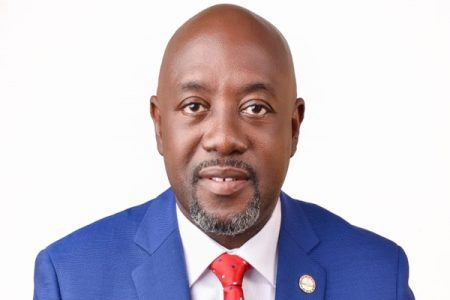Member of Parliament (MP) for New Juaben North Nana Osei-Adjei, has issued a stern warning about the potential economic and developmental setbacks Ghana could face following the freezing of United States Agency for International Development (USAID) funding.
The funding suspension follows an executive order signed by then-U.S. President Donald Trump, which triggered a halt in USAID operations, placing all staff on leave and creating uncertainty about the organisation’s future.
Whether through policy adjustments, increased private-sector engagement, or diplomatic efforts to restore funding, Osei-Adjei said the decisions made in the coming months would be crucial in determining the nation’s economic and social trajectory.
Government estimates suggest that this action could leave a funding gap of approximately $156 million in the economy.
The most critical concern is the anticipated $78.2 million shortfall, which threatens essential public health interventions, including malaria prevention, maternal and child health, family planning, reproductive health, nutrition, and HIV/AIDS treatment.
In response, President John Dramani Mahama has directed the Deputy Minister for Finance, Dr. Cassiel Ato Forson, to take immediate steps to mitigate the financial shortfall resulting from the USAID suspension.
The vital role of USAID in Ghana’s development
USAID has played a crucial role in Ghana’s socio-economic progress for decades.
The agency has been instrumental in strengthening healthcare, improving educational systems, promoting agricultural sustainability, and supporting democratic governance.
In the healthcare sector, USAID has been a key contributor to Ghana’s efforts to combat infectious diseases.
The agency has supported malaria prevention strategies, maternal and child health initiatives, and nutrition programs, while also playing a vital role in HIV/AIDS treatment through the U.S. President’s Emergency Plan for AIDS Relief (PEPFAR).
The potential funding cut could disrupt the availability of antiretroviral drugs, testing, and preventive measures, endangering the lives of thousands of patients.
Similarly, in the education sector, USAID has been a lifeline for low-fee private schools, particularly in northern Ghana, where education infrastructure is weaker.
The agency has helped improve school performance, enhance accountability within the Ministry of Education, and ensure sustainable education systems in deprived areas.
Through its Feed the Future initiative, USAID has significantly supported smallholder farmers, particularly in northern Ghana, where poverty and malnutrition remain major concerns.
The programme has boosted food production, improved market access, and enhanced the resilience of farmers.
A withdrawal of these interventions could lead to a decline in agricultural productivity, affecting food security and rural livelihoods.
Beyond these sectors, USAID has been instrumental in strengthening Ghana’s democracy, governance, and human rights.
The agency has played a key role in ensuring free and fair elections, enhancing local governance, and promoting transparency and accountability in public institutions.
Economic and social risks of USAID funding suspension
Nana Osei-Adjei expressed deep concerns that the withdrawal of USAID support could lead to significant economic repercussions. Thousands of jobs, particularly in agriculture and trade, are directly linked to USAID projects.
Any disruption to these initiatives could lead to increased unemployment and financial hardship for many households.
The MP also highlighted potential threats to democratic stability, cautioning that a sudden cessation of USAID’s governance-related programmes could undermine public confidence in state institutions.
“A USAID withdrawal would disrupt these efforts, threatening democratic integrity and public trust,” he stated.
Lessons from Nigeria
Nana Osei-Adjei urged Ghana to take proactive steps, citing Nigeria’s response as a model.
Nigeria’s Federal Executive Council approved $1.07 billion for healthcare reforms following the USAID shutdown directive, demonstrating the importance of self-reliance.
He also praised former President Nana Akufo-Addo’s foresight in establishing Ghana’s National Vaccine Institute as a crucial step toward reducing dependency on foreign aid.
The MP called for increased domestic resource mobilisation and stronger public-private partnerships to fill the financial gaps created by USAID’s suspension.
He emphasized that Ghana must diversify its development partnerships beyond the United States, urging policymakers to explore alternative funding sources.
“No country can build a sustainable future by relying solely on foreign aid,” he stated.
The way forward
While the USAID funding freeze poses an immediate challenge, Nana Osei-Adjei believes that Ghana has an opportunity to reassess its development strategy.
By boosting domestic revenue generation, leveraging innovative financing models, and strengthening local governance structures, the country can work toward a more self-sustaining future.
- KNUST declares 2 former students persona non grata - 14 April 2025
- Electricity: 352% tariff hike in 16 years burdening customers - 14 April 2025
- PUWU outlines better alternatives to ECG privatisation - 14 April 2025

